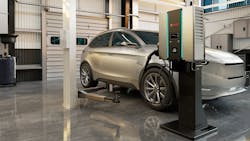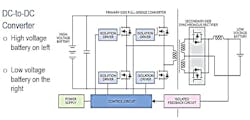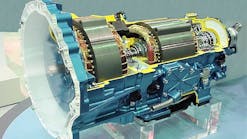Dispelling common myths of EV repair and maintenance
Electric vehicles are more mainstream than ever, and they will only become more prevalent as we approach 2035, the fully electric goalpost set by auto manufacturers and the State of California. The transition to electric vehicles will have a major impact on transportation, manufacturing, shipping, agriculture, and more, and the automotive maintenance and repair industry is no exception.
Fortunately, the idea that EV maintenance will completely differ from that of a gas-powered vehicle stems from confusion and the lack of exposure to the seemingly daunting technology. As a result, there are many myths around the servicing of electric vehicles, including the idea that EVs need more maintenance, the thought that shop owners need to be prepared for EVs right away, and that EV tools and equipment may not bring a positive return on investment.
Of course, we will all develop a larger understanding of the evolved technology as more people run into electric vehicles in their everyday, in media, on the road, at the dealership, etc. For now, many technicians and shop owners are faced with a unique set of challenges in the transition to electric vehicles. including how to adequately communicate with customers about EV maintenance, when to invest in the right tools/equipment and more. Training, exposure and communication on all levels will give technicians the tools they need to succeed in this transition and overcome these myths.
Myth: EVs require more maintenance and are more difficult to repair than Gas-powered Vehicles
According to the Department of Energy, electric vehicles usually require less maintenance compared to conventional ICE vehicles for a myriad of reasons including:
- The EV battery, motor and other electronics require little to no regular maintenance
- There are fewer fluids, such as engine oil, that need regular maintenance
- Regenerative braking in EV’s significantly reduce brake wear
Put simply, electric vehicles are no more difficult to repair than their gas-powered counterparts because they have fewer moving parts. While many elements of auto maintenance and repair may be evolving, there are some new additions to take note of.
Since EVs run on battery power and have fewer internal fluids, EV owners are able to save time and money by not needing to budget for two to three oil changes a year. Additionally, brake wear-and-tear will be reduced in electric vehicles due to regenerative braking, the process of a vehicle capturing heat energy from the brakes and converting it to usable energy for the battery. However, that is not to say maintenance will magically disappear in the transition to electric vehicles.
Lithium-ion batteries, the most common batteries found in an electric vehicle, can become very hot after long hours of use or due to other uncontrollable conditions. Anyone who’s used a smart phone at the beach will agree. If we apply this logic to electric vehicle batteries, which are hundreds of times bigger than the average smart phone, then we truly see the importance of the battery cooling system.
EV cooling systems are meant to regulate the temperature of the battery pack through a series of cooling loops and radiators to reduce excess heat and an electric pump to circulate coolant within the battery. These cooling systems are important to the overall performance of the vehicle and lifespan of the battery, as overheating can accelerate the rate of battery degradation. Like anything, these cooling systems will need to be checked according to the manufacturer’s instructions.
Finally, many parts and components on EVs will need similar repair/maintenance as any gas-powered vehicle including steering systems, air filters, and windshield wipers.
Myth: Shop owners will have to be prepared to service EVs right away
With the seemingly fast transition to electric vehicles, shops across the country feel like they are being forced to service them just as quickly. In reality, gas-powered vehicles will still be relevant in many parts of the country as EVs will only make up 13% of vehicles on the road in 2035. That number is expected to reach 95 percent in 2050, which leaves shop owners plenty of time to prepare for the EV transition by training technicians, investing in EV tools and equipment, installing electric chargers etc.
A shop’s need to service electric vehicles will be determined by the location of the shop, the customer base and priorities of the owner. A repair shop in California, where over one million EVs have already been sold, will have many more electric vehicle repairs than a repair shop in Michigan, which has far fewer EVs on the road. On the surface, investing in EV-compatible equipment makes a lot more sense in California than for the shop owner in Michigan.
However, the benefits available to the Michigan shop owner, should they choose to make the investment, are worth noting. Although Michigan has far fewer EVs on the road than California, the repair options available to those who are driving electric within the state are slim. This presents a window of opportunity for the shop owner to become the EV repair expert within their region, ushering in a great deal of new business by embracing the current novelty of EV repair in rural areas.
Myth: Buying tools that service EVs will not provide an adequate return on investment
Many auto repair technicians are hesitant to invest in tools that service electric vehicles for fear they will not see adequate return on that investment.
First, consider that the equipment you purchase to service EVs can likely prove useful for ICE repair in a variety of ways. Take an EV-capable lifting table, for instance; while its main purpose is removing battery packs from EVs, you’ll find it also functions as a work surface for taking engines apart and reassembling transmissions. Think outside the box of ways EV-compatible tools can be used elsewhere around your shop.
Preparing your shop’s staff to take on electric vehicle repair also doesn’t have to come at a loss. Introducing and offering electric vehicle-related training to technicians of all experience levels benefits everyone in the shop, especially the customer who will be looking for the best service. Additionally, providing technicians with EV training sessions, thereby expanding their EV knowledge and skill set, can be used as a valuable tool in recruiting technicians, especially when you consider the labor shortage.
Much of the training that readies technicians for EV repair can also come in handy when dealing with ICE vehicles. It’s likely that any EV repair training program you enroll your technicians in will expose them to the ins and outs of things like emergency braking and ADAS – features which are hardly unique to EVs. This means that you can prepare for the days when EVs are dominating the auto landscape while still benefiting from what you learn when repairing the majority of ICE vehicles you encounter now.
Shop owners can take advantage of state and federal rebates by installing electric vehicle charging stations for their customers provided through state and federal energy rebates. Electric vehicle charging stations can act as an amenity for customers who may be leaving their vehicles at the shop for multiple days. They can also act as a form of marketing – possibly making the difference between someone choosing to go to one shop over another.
Electric vehicles will revolutionize many industries quickly and in major ways, however, current automotive repair and maintenance practices will remain relevant as the world transitions to electric vehicles. Any changes during the transitionary period will depend on how quickly the new form of mobility is adopted and how shop owners will respond, according to their goals and their regional market.



